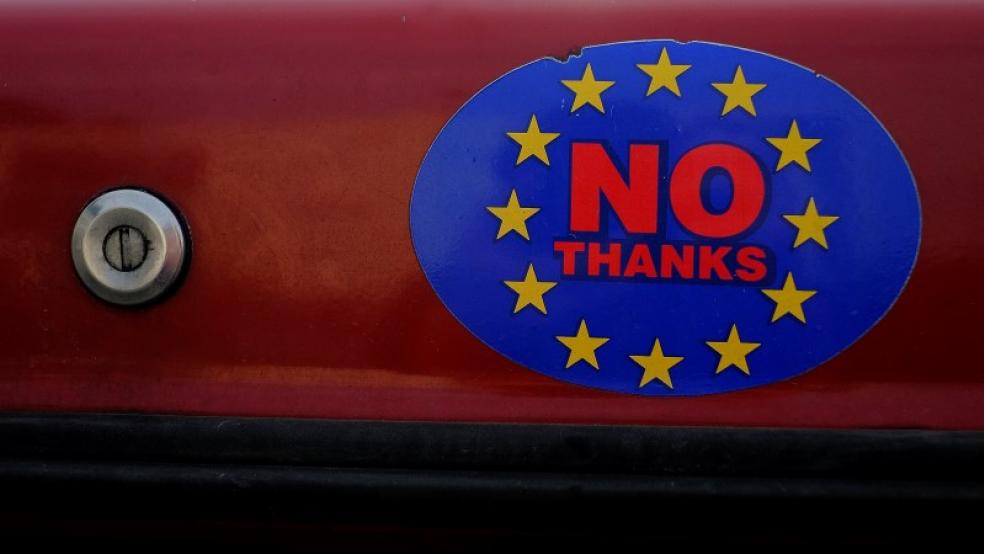Global markets are under historic pressure on Friday after voters in the United Kingdom surprised the world with a decision to leave the European Union after more than 40 years of membership.
By all accounts, the pressure is set to continue as the eight-year-old bull market faces its most serious existential threat yet. The political fallout is just beginning, with pro-remain British Prime Minister David Cameron resigning and "Article 50" — the EU's exit clause — yet to be invoked by the British government.
U.S. stocks have tumbled nearly 3 percent despite aggressive efforts by central bankers and other policy officials to bolster sentiment overnight with promises of dollar swap liquidity and vague reassurances to lean against chaotic currency market volatility. Suddenly, Federal Reserve Chair Janet Yellen and European Central Bank chief Mario Draghi look impotent in the face of a popular repudiation of top-down elitism.
Related: 3 Ways the Brexit Affects You
The result of the vote was a repudiation of the post-war era of globalism driven by anger over immigration, stagnant economies and unaccountable bureaucrats in Brussels. To say all this was unexpected would be a massive understatement. Betting markets had the odds of “remain” winning at around 90 percent on Thursday. The Dow Jones Industrial Average enjoyed a cute surge back above the 18,000 level into the close.
Early Friday morning, a whiff of panic was in the air.
The British pound dropped to levels not seen since the mid-1980s. U.S. equity futures were halted as circuit breakers kicked in. European bank stocks, the epicenter of all of this because of their European bond holdings and exposure to the local economy, were crushed.
Let’s briefly recap the carnage:
A surge in the Japanese yen smashed popular currency carry trades and sent the Nikkei 225 index to a loss of 1,286 points or a stomach-churning 7.9 percent.
Related: Sterling Hits Lowest in Three Decades as Brexit Stuns Market
The European Stoxx 600 plunged 6 percent.
London’s FTSE 100 lost 2.4 percent. Germany’s Xetra DAX lost 6.2 percent. Greek stocks lost nearly 16 percent, while Italian stocks were down 12.5 percent. As pro-nationalist political sentiments rise, Italy is seen as a prime candidate to consider an independence referendum (along with France and the Netherlands). A breakdown in the European Union would threaten Greece's bailout programs, since a smaller Euro area would put the rescue burden on a smaller number of countries.
The policy elites are in a serious bind with a situation that looks, in some ways, worse than the 2008-2009 financial crisis.
For one, all the obvious policy easing levers have already been pulled.
The Federal Reserve has only raised interest rates once this cycle, leaving the federal funds rate in a range between 0.25 percent and 0.50 percent. So there isn't much room to cut rates from here. Aggressive bond-buying stimulus programs have already been deployed, with the Fed holding nearly $4.5 trillion in assets vs. $900 billion back in 2008.
The Bank of Japan is buying stocks via exchange-traded funds. The ECB is buying corporate bonds. Both have deployed negative interest rates with calamitous effect as those rates have pressured bank profitability by narrowing net interest margins. What is left? The outright purchase of individual stocks? In the case of the Fed, this would be an illegal act.
Second, this comes at a time of global economic vulnerability.
Here in the United States, we're in the midst of an outright earnings recession, with S&P 500 earnings down for the last four quarters in a row. Deflation is a real threat, made worse by elevated public debt-to-GDP ratios in the developed world. Spain, Poland, Greece, Italy, Switzerland and the Euro area as a whole are all in outright deflation. France, the Netherlands, Ireland, Germany, the U.K. and Finland all have inflation rates near 0 percent.
Italy, a too-big-to-fail Eurozone country, is among the worst off, suffering from a 11.7 percent jobless rate and a 133 percent debt-to-GDP ratio. Spain is carrying a 99 percent debt ratio and a 21 percent jobless rate. Even France has a 96 percent debt ratio and a 10.2 percent jobless rate.
Related: How the Brexit Affects Your Retirement
In Asia, China is contending with a slow-burn credit crisis. It is trying to manage down its currency in an effort to bolster exports. A collapse in the British pound and the euro threatens that, which could unleash outright currency manipulation and bring on a mercantilist foreign exchange war. Japan is a mess, with a 229 percent debt-to-GDP ratio, a 6 percent budget deficit, deflation and an economy on the verge of contraction. Similar to China, officials in Japan are obsessing over keeping the yen weak in an effort to bolster exports.
Third, any policy response is likely to only deepen the problem.
If central bankers support markets here — keeping stocks in the low-volatility sideways crawl of the last three months, capping a three-year consolidation near Dow 18,000 — it will prove all the pre-Brexit fearmongering hollow and will encourage pro-independence votes in Italy and elsewhere.
But if they let markets fall, volatility will beget volatility as one of the few bright spots in the global economy darkens. Years of central bank intervention and easy gains have encouraged risk-taking and leverage accumulation. The collapse could be swift and severe.






